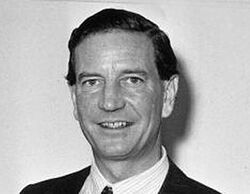Difference between revisions of "Double agent"
(Created page with "{{concept |wikipedia=https://en.wikipedia.org/wiki/Double_agent |image= |constitutes=spook }} A '''Double agent''' is an agent who works for two 'sides' simultaneously. {{SMW...") |
(unstub) |
||
| Line 1: | Line 1: | ||
{{concept | {{concept | ||
|wikipedia=https://en.wikipedia.org/wiki/Double_agent | |wikipedia=https://en.wikipedia.org/wiki/Double_agent | ||
| − | |image= | + | |image=Kim Philby.jpg |
| + | |image_caption=Double agent [[Kim Philby]] | ||
|constitutes=spook | |constitutes=spook | ||
| + | |description="Turned" agents that are often used to transmit [[disinformation]] or to identify other agents as part of [[Counterintelligence|counter-espionage]] operations | ||
}} | }} | ||
| − | + | In the field of [[counterintelligence]], a '''double agent''' is an employee of a secret intelligence service for one country, whose primary purpose is to [[spy]] on a target organization of another country, but who is now spying on their own country's organization for the target organization.<ref>http://www.merriam-webster.com/dictionary/double%20agent</ref> | |
| + | |||
| + | Double agentry may be practiced by spies of the target organization who infiltrate the controlling organization or may result from the ''turning'' (switching sides) of previously loyal agents of the controlling organization by the target. The threat of execution is the most common method of turning a captured agent (working for an intelligence service) into a double agent (working for a foreign intelligence service) or a double agent into a '''[[triple agent]]'''. | ||
| + | |||
| + | It is unlike a [[Defection|defector]], who is not considered an agent as agents are in place to function for an intelligence service and defectors are not, but some consider that defectors in place are agents until they have defected. | ||
| + | |||
| + | Double agents are often used to transmit [[disinformation]] or to identify other agents as part of [[Counterintelligence|counter-espionage]] operations. They are often very trusted by the controlling organization since the target organization will give them true, but useless or even counterproductive, information to pass along.<ref>https://www.cia.gov/library/center-for-the-study-of-intelligence/kent-csi/vol6no1/html/v06i1a05p_0001.htm</ref> If remaining undiscovered, they may advance to top positions, even leaders, and wreak havoc on an intelligence service. | ||
{{SMWDocs}} | {{SMWDocs}} | ||
==References== | ==References== | ||
{{reflist}} | {{reflist}} | ||
| − | |||
Latest revision as of 06:00, 30 November 2021
(spook) | |
|---|---|
 Double agent Kim Philby | |
| "Turned" agents that are often used to transmit disinformation or to identify other agents as part of counter-espionage operations |
In the field of counterintelligence, a double agent is an employee of a secret intelligence service for one country, whose primary purpose is to spy on a target organization of another country, but who is now spying on their own country's organization for the target organization.[1]
Double agentry may be practiced by spies of the target organization who infiltrate the controlling organization or may result from the turning (switching sides) of previously loyal agents of the controlling organization by the target. The threat of execution is the most common method of turning a captured agent (working for an intelligence service) into a double agent (working for a foreign intelligence service) or a double agent into a triple agent.
It is unlike a defector, who is not considered an agent as agents are in place to function for an intelligence service and defectors are not, but some consider that defectors in place are agents until they have defected.
Double agents are often used to transmit disinformation or to identify other agents as part of counter-espionage operations. They are often very trusted by the controlling organization since the target organization will give them true, but useless or even counterproductive, information to pass along.[2] If remaining undiscovered, they may advance to top positions, even leaders, and wreak havoc on an intelligence service.
Examples
| Page name | Description |
|---|---|
| Majid Giaka | Libya intelligence worker, became a CIA asset in 1988 and defected to the United States in 1991. |
| Marwan Khreesat | Spooky Jordanian bomb maker |
| Davey Neligan | First head of the newly formed The Irish Free State Garda Special Branch and a key figure in the |
| Kim Philby | |
| Sergei Skripal | The Russian double agent at the heart of the Skripal affair. Possibly being held at an unknown location by UK authorities |